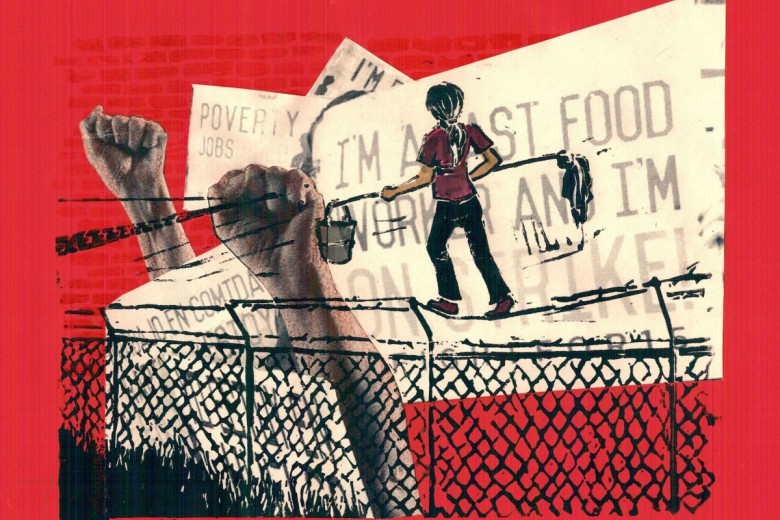
Even after the doctors had left, the Peruvian alpaca sweaters lay neatly folded in the large suitcase near the entrance. The clothing had been carefully selected, packed and transported to the edge of town the previous day in the hope that a group of foreign doctors who were passing through the area might take an interest. After perusing the collection, however, the foreigners purchased the inexpensive finger puppets in lieu of the pricier sweaters, hats and mittens. Pressured to compete with the market prices in downtown Arequipa, the knitters had even offered a discount.
The knitters, who call themselves Ñaña (meaning “sisters” in the local indigenous language, Quechua), are constantly mindful of their struggle to earn a living wage. Located in the dusty, depressed community of Alto Cayma on the outskirts of beautiful Arequipa, Peru, Ñaña’s three-room workshop offers its members a refuge from past hardships and current struggles. Inside, the women are welcomed and supported by one another.
Though their genuine alpaca clothing is far superior to the products sold in the city centre, foreign tourists don’t know — or care — about the difference and are often unwilling to pay the premium. Accustomed to paying essentially pennies for souvenirs in Southern countries, buyers bargain the city vendors down from their already too-low prices to prices that oftentimes do not even cover the original costs.
Because of this, the members of Ñaña have refused to sell their products in the local markets for the last few years. The members are instead focusing on a much wider, global clientele. As the women regularly remind themselves, they must “salir adelante.” Roughly translated, this means to “pull through” or “forge ahead.”
“I want it to be a big business, to be able to export” explains Andrea Gutierrez, one of the founding members of Ñaña. “That’s my dream.”
The story of Gutierrez’s life resembles that of many of her compañeras. As a child she experienced the crushing effects of losing five of her 13 siblings to poverty-related deaths; as a teenager she worked long hours tending to animals and working for a street vendor before becoming a single mother at the age of 20. Forced to relocate to Arequipa, she began grueling fieldwork to support her son.
Around the time of her second son’s birth two years later, she connected with a friend and began spending afternoons knitting. The hobby had never gone beyond generating a small side income, but now it seemed more lucrative.
Until 2004 the women would meet and knit every Wednesday; it was still necessary to hold other jobs to support themselves. At first they spent the entirety of the day and well into the night knitting in someone’s home. They would then walk an hour from Alto Cayma to Arequipa’s city centre because they could not afford a taxi or bus. For all their efforts, they would be rewarded with roughly $3 for a pair of mittens.
“I was fine, but the prices just didn’t go up” Gutierrez said.
Eventually a place to knit and market their products was arranged by a local priest in Alto Cayma. Other resources began trickling in and more women began to join. Today there are a handful of regulars with another 15 or so who cycle through. Some of the women have been knitting their entire lives; others have only just begun. Some still hold other part-time jobs. The vast majority of the women have children. All want to improve their knitting and expand their business.
Yeny Narcy Panta Coripua, who began knitting when she joined the group, credits a lot of her success to Gutierrez, who always pushed her to learn.
“Yes, you can. You have to come, you have to come” Coripua said Gutierrez told her when she doubted herself.
Coripua began working as an empleada, or domestic worker, at the age of eight to support her four siblings when her father passed away and her mother abandoned them. At the age of 20, pregnant and alone, she too came to the Arequipa area. She worked as a money changer for the local buses and later owned a food stand before meeting her now-husband. She eventually found Ñaña because her second-born child attended daycare in the same complex. Knitting through Ñaña has now provided her with a sense of independence and self-worth that former jobs could not.
Whatever their backgrounds, the women share one common goal: expand Ñaña for the benefit of everyone involved. When speaking about their objectives, they use “we” and “us” rather than “I” or “me.” Their struggle continues to be an uphill battle as they resist the urge to sell their products for less than they are worth. Their name is also still relatively unknown and the current recession has not helped their business. Fortunately, they have established connections with a few fair trade stores and high schools in North America. Despite the odds, they are determined to continue forging ahead in search of financial independence for themselves and their families.





_780_520_90_s_c1.jpg)
